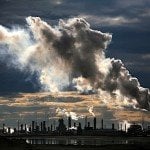
Investing billions of dollars in the energy sector does not appear to be a likely scenario in these days of depressed crude oil prices, but the Conference Board of Canada urges that such investment in British Columbia’s liquefied natural gas industry is exactly what Canada needs to do. Developing an LNG industry of 30 million tonnes per annum, which would require an investment of $7 billion annually, would grow the country’s economy by an average of $7.4 billion per year over the next thirty years. Most of that, $5.3 billion, would be in British Columbia, but national employment would increase by an average of 65,000 jobs, the report claims.
There are currently twenty-one proposed LNG projects awaiting approvals in British Columbia. The report attempts to quantify the economic impacts of an industry that is largely hypothetical. None of the proposed projects has been built.
Nevertheless, the report’s conclusions, which its authors acknowledge are subject to “a great deal of uncertainty,” are based on three hypothetical projects which would come into service between 2021 and 2025. The bulk of the investment would be required to develop the resource, to produce enough natural gas to supply the liquefaction terminals with feedstock.
Most of the jobs that would result would be in construction, manufacturing and in the resource sector, with spillover effects on the wholesale and retail trade industries. Tax and royalty revenues for the BC government would be close to $1 billion over the lifetime of the projects, while average annual revenues for both provincial and federal governments would be $3 billion and $3.2 billion respectively between 2016 and 2045.
The LNG industry has continued to grow globally, and 80 per cent of trade in LNG is centred in North America. In 2014, record volumes of LNG were traded, reaching 241.1 million tonnes per annum (MTPA). Liquefaction capacity, however, has been growing “modestly” since 2011 and stood at 301 MTPA in 2014.
BC’s LNG industry is described as being at a “critical” stage in the Conference Board report, as decisions to move forward are being taken in the context of uncertainty regarding cost and energy pricing.

































